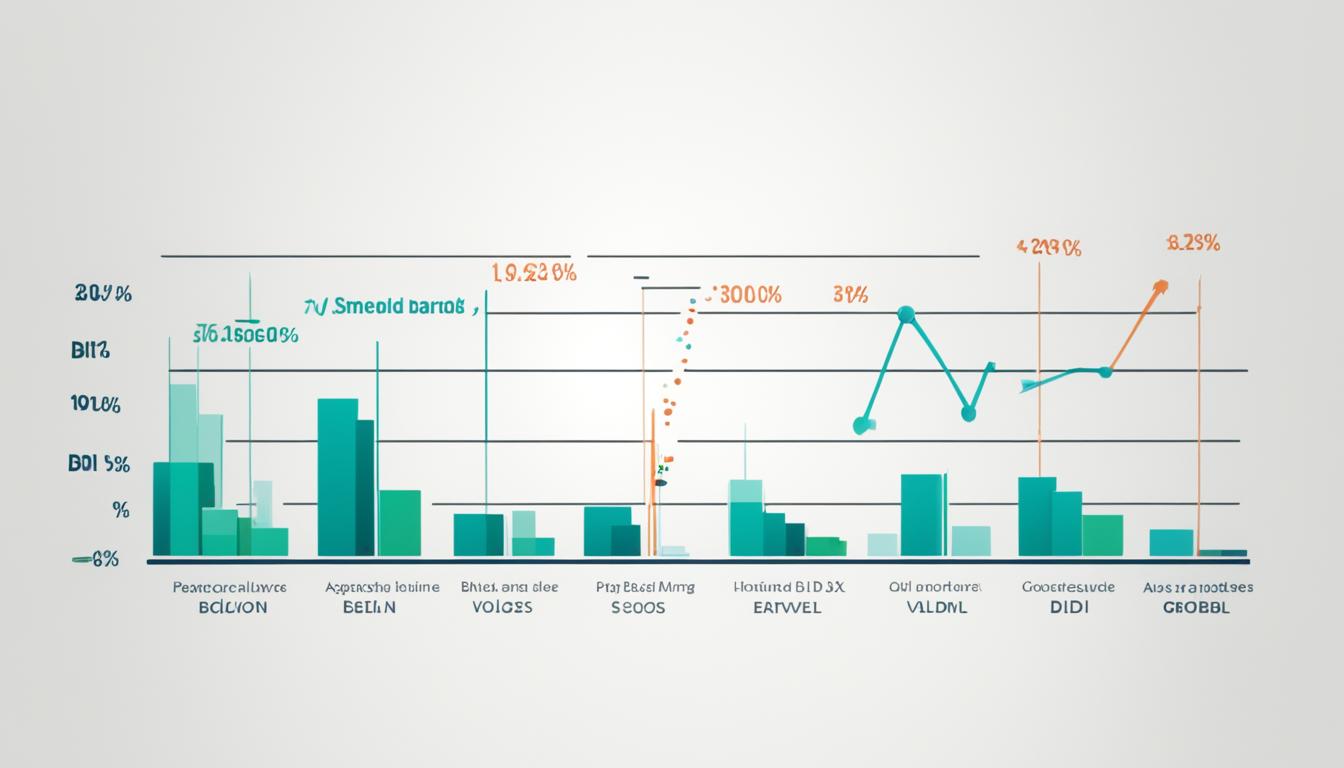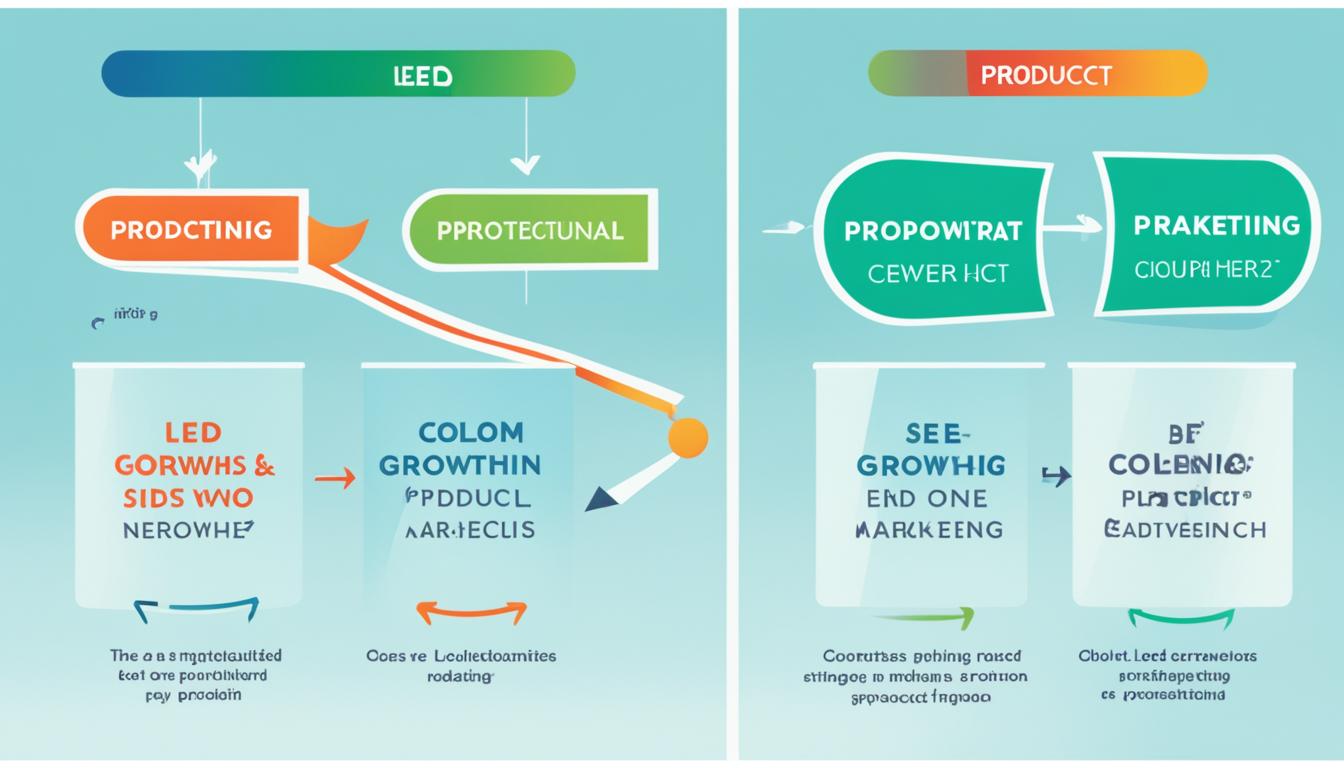When it comes to marketing tools, CRM (Customer Relationship Management) and email marketing are two popular choices. In this guide, we will explore the differences between CRM and email marketing, their respective benefits and advantages, and how they can be integrated for maximum effectiveness.
Key Takeaways
- CRM and email marketing are both essential tools for achieving marketing goals.
- CRM tools help manage customer relationships, identify sales opportunities, and track customer issues.
- Email marketing software focuses on building email lists and launching targeted campaigns.
- By integrating CRM and email marketing, businesses can reach their target audience effectively and drive sales.
- Choosing the right CRM tools and email marketing software is crucial for successful implementation.
Difference Between a CRM tool and an Email Marketing Software
A CRM tool and an Email Marketing Software are two distinct tools that serve different purposes in a business’s marketing strategy. Understanding the differences between these tools is crucial for leveraging their functionalities effectively.
CRM tool:
A CRM tool, which stands for Customer Relationship Management, is designed to help businesses manage and improve their relationships with customers. It offers a comprehensive set of features and functionalities aimed at enhancing customer engagement and satisfaction.
Key functionalities of a CRM tool include:
- Managing and tracking customer information
- Launching marketing campaigns
- Identifying and capitalizing on sales opportunities
- Tracking and resolving customer issues
By centralizing customer data, a CRM tool enables businesses to gain valuable insights into customer behavior, preferences, and interactions. This information can then be used to create personalized marketing strategies and improve customer service.
Email Marketing Software:
Email marketing software, as the name suggests, focuses primarily on building email lists and executing targeted email campaigns. It enables businesses to reach their target audience directly and deliver personalized messages that drive engagement and sales.
Key functionalities of email marketing software include:
- Building and managing email lists
- Creating and designing email campaigns
- Personalizing and segmenting email content
- Analyzing and reporting campaign performance
Email marketing software provides businesses with tools to automate email campaigns, track email opens and clicks, and measure the effectiveness of email marketing efforts. It enables businesses to nurture leads, build brand awareness, and drive conversions through effective email communication.
While CRM tools and email marketing software may share some overlapping features, they have distinct purposes and functionalities. A CRM tool focuses on managing customer relationships and overall business processes, while email marketing software specializes in executing targeted email campaigns for customer acquisition and engagement.
A holistic marketing strategy often involves integrating both CRM tools and email marketing software to leverage their respective strengths. By combining the customer insights and relationship management capabilities offered by CRM tools with the direct and personalized communication facilitated by email marketing software, businesses can effectively nurture leads, build customer loyalty, and drive sales.
Why are CRM and Email Marketing Necessary?
Both CRM and email marketing play crucial roles in achieving marketing goals. With a focus on building strong customer relationships and driving sales, these two strategies complement each other to create a comprehensive and effective marketing approach. Let’s explore why CRM and email marketing are necessary components of any successful marketing strategy.
The Importance of CRM
A Customer Relationship Management (CRM) system is essential for businesses to manage customer relationships and track sales opportunities. Here are some key reasons why CRM is necessary:
- Improved Customer Relationships: CRM allows businesses to gather and store customer data, providing valuable insights that enable personalized interactions, improved customer service, and overall customer satisfaction.
- Sales Opportunity Tracking: CRM tools enable businesses to track sales opportunities from the initial lead stage to closing the deal. By having a centralized system, sales teams can efficiently manage prospects, prioritize follow-ups, and maximize revenue.
- Efficient Marketing Campaigns: CRM systems allow businesses to segment their customer data, enabling targeted marketing campaigns. By tailoring messages to specific customer segments, businesses can increase engagement and conversion rates.
The Power of Email Marketing
Email marketing is a highly effective and cost-efficient strategy for businesses to communicate with their target audience and promote products or services. Here’s why email marketing is necessary:
- Direct Communication: Email marketing provides a direct line of communication with customers. By sending personalized, targeted emails, businesses can deliver relevant content to their audience, nurturing relationships and driving conversions.
- Increased Brand Awareness: Consistent email communication keeps a brand at the forefront of customers’ minds. By delivering valuable content and promotions, businesses can strengthen their brand identity and increase brand awareness.
- Measureable Results: Email marketing platforms provide detailed analytics to track the performance of email campaigns. Businesses can measure open rates, click-through rates, and conversion rates, enabling data-driven decision-making for future campaigns.
Combining CRM and Email Marketing
By combining CRM and email marketing, businesses can leverage the benefits of both strategies to achieve their marketing goals. CRM provides the foundation for managing customer relationships, while email marketing offers targeted communication and promotion. Together, these strategies enable businesses to effectively reach their target audience, nurture leads, and drive sales.
To illustrate the integration of CRM and email marketing, below is a comparison table highlighting the key features and benefits of both strategies:
| CRM | Email Marketing |
|---|---|
| Manages customer relationships | Enables targeted communication |
| Tracks sales opportunities | Promotes products or services |
| Provides customer data insights | Delivers personalized content |
| Simplifies marketing campaign management | Increase brand awareness |
| Improves customer service | Measures campaign performance |
Combining CRM and email marketing allows businesses to create targeted, personalized campaigns based on customer data, resulting in increased engagement and conversion rates. This integrated approach helps businesses achieve their marketing goals more effectively and efficiently.
Advantages of CRM Tools
CRM tools offer several advantages for businesses, providing them with a range of features and capabilities that enhance their daily operations, decision-making, and customer management. These tools streamline various tasks and processes, saving time, increasing productivity, and improving overall efficiency.
1. Automation of Daily Tasks
One of the key advantages of CRM tools is their ability to automate daily tasks. By automating routine activities such as filling out forms, sending reports, and scheduling meetings, CRM tools enable businesses to focus their time and resources on more critical tasks. This automation not only saves time but also increases productivity and ensures accuracy in data entry.
2. Enhanced Reporting and Data Analysis
CRM tools provide businesses with advanced reporting and data analysis capabilities. These tools collect and consolidate data from various sources, allowing businesses to gain valuable insights into their customer behavior, sales performance, and marketing campaigns. With comprehensive reporting and data analysis functionalities, businesses can make data-driven decisions, identify trends, assess performance, and refine their strategies accordingly.
3. Efficient Storage and Access to Organizational Information
CRM tools help organizations store and access customer information effectively. By centralizing customer data and providing easy access to relevant stakeholders, CRM tools enable businesses to have a holistic view of their customers and their interactions. This comprehensive customer database enhances customer relationships, enables personalized communication, and enables better customer service.
| Advantage | Description |
|---|---|
| Automation of Daily Tasks | Streamline routine activities, saving time and increasing productivity. |
| Enhanced Reporting and Data Analysis | Advanced capabilities for collecting, analyzing, and interpreting data. |
| Efficient Storage and Access to Organizational Information | Centralized storage and easy access to customer data for improved customer relationships and service. |
With the various advantages CRM tools offer, businesses can streamline their operations, gain deeper insights, and optimize their customer management processes. These tools play a crucial role in driving business growth and success in today’s competitive market.
Advantages of Email Marketing Tools
Email marketing tools offer a range of advantages for businesses looking to effectively connect with their audience and drive conversions. These tools provide powerful features and functionalities that help businesses build email lists and reach their target audience directly. Here are some key advantages of using email marketing tools:
- Build email lists: Email marketing tools enable businesses to build and expand their email lists, allowing them to reach a larger audience and increase brand awareness.
- Reach target audience: With email marketing tools, businesses can directly communicate with their target audience. By delivering personalized messages and valuable content, businesses can build trust and establish meaningful relationships with their subscribers.
- Higher conversion rates: By targeting specific segments of their audience and delivering tailored content, businesses can significantly increase their conversion rates. Personalized messages and targeted offers have a greater impact on recipients, leading to higher engagement and improved sales.
- Cost-effective distribution channels: Email marketing tools provide a cost-effective way to distribute marketing messages. Compared to traditional marketing channels, such as print ads or direct mail, email marketing allows businesses to reach a larger audience at a lower cost.
- Track and measure campaign performance: Email marketing tools provide robust analytics and reporting features that allow businesses to track and measure the performance of their email campaigns. By analyzing key metrics such as open rates, click-through rates, and conversions, businesses can optimize their campaigns for better results.
Overall, email marketing tools are essential for businesses looking to build and maintain effective communication with their target audience. By leveraging the advantages of these tools, businesses can drive engagement, increase brand loyalty, and ultimately achieve their marketing goals.
| Email Marketing Tool | Advantages |
|---|---|
| SendX |
|
| GetResponse |
|
| Aweber |
|
How do CRM and Email Marketing Tools Help in Achieving Marketing Goals?
Both CRM and email marketing tools play a crucial role in achieving marketing goals. CRM tools help businesses manage customer relationships, identify sales opportunities, and nurture leads through the sales pipeline.
With CRM tools, businesses can:
- Store and organize customer information.
- Track customer interactions and communication history.
- Analyze customer data for insights and trends.
- Identify and prioritize sales leads.
- Improve customer service and support.
Email marketing tools, on the other hand, enable businesses to reach their target audience directly, build relationships, and drive conversions.
With email marketing tools, businesses can:
- Build and manage email lists.
- Create personalized and engaging email campaigns.
- Segment and target specific audience groups.
- Automate email sending and follow-up sequences.
- Track email campaign performance and engagement metrics.
By using these tools together, businesses can effectively acquire customers, generate leads, and drive sales. CRM tools provide the foundation for managing and nurturing customer relationships, while email marketing tools offer a direct and personalized channel for communication and conversion.
| CRM Tools | Email Marketing Tools |
|---|---|
| Manage customer relationships | Build and manage email lists |
| Identify sales opportunities | Create personalized email campaigns |
| Nurture leads | Segment and target specific audiences |
| Store and analyze customer data | Automate email sending |
| Improve customer service | Track campaign performance |
CRM Vs Email Marketing Software Functionalities: What to Look For?
When comparing CRM and email marketing software, it is important to consider their key functionalities. Understanding the specific features and capabilities of each tool will help businesses make informed decisions and choose the software that aligns best with their needs and goals.
Key Functions of CRM Tools:
In a CRM tool, key functions to look for include:
- Contact Management: The ability to store and organize customer information, including contact details, communication history, and preferences.
- Sales Management: Tools that assist in managing the entire sales process, from lead generation to closing deals.
- Workflow Processes: Automation of repetitive tasks, streamlining workflows, and ensuring efficient operations.
- Project Management: Features that facilitate project collaboration, task assignment, and tracking progress.
- Customer Service Capabilities: Tools that enable effective customer service, such as ticket management, case resolution, and knowledge base integration.
Key Functions of Email Marketing Software:
For email marketing software, important functions to consider include:
- Email List Building: Tools for capturing, managing, and growing email subscriber lists.
- Email Campaign Creation: Features that allow for the creation and customization of visually appealing and engaging email campaigns.
- Personalization and Segmentation: The ability to personalize email content based on recipient data and segment email lists for targeted messaging.
- Analytics and Reporting Features: Robust analytics and reporting capabilities to track email campaign performance, including open rates, click-through rates, and conversions.
By carefully evaluating these functionalities, businesses can make informed decisions when choosing between CRM tools and email marketing software. It is important to select the tools that align with their specific requirements and enable them to effectively manage customer relationships, drive sales, and achieve marketing goals.
What are Some Examples of CRM Tools and Email Marketing Software?
When it comes to managing customer relationships and executing email campaigns, businesses have a wide range of CRM tools and email marketing software options to choose from. Here are some popular examples:
CRM Tools:
| CRM Tool | Description |
|---|---|
| Insightly | Insightly is a powerful CRM tool that helps businesses organize their customer information, track sales opportunities, and automate workflows. |
| Nutshell | Nutshell provides businesses with a user-friendly CRM solution, offering features like contact management, sales tracking, and email integration. |
Email Marketing Software:
| Email Marketing Software | Description |
|---|---|
| SendX | SendX is an all-in-one email marketing platform that enables businesses to create and send personalized email campaigns, automate workflows, and analyze results. |
| GetResponse | GetResponse offers a comprehensive suite of email marketing tools, including email list building, responsive email templates, and advanced analytics. |
| Aweber | Aweber is a popular email marketing platform that offers a wide range of features, including email automation, landing page creation, and subscriber segmentation. |
These CRM tools and email marketing software options provide businesses with the necessary tools and functionality to effectively manage customer relationships, improve sales processes, build email lists, and execute targeted email campaigns.

Conclusion
In conclusion, both CRM and email marketing are essential tools for businesses looking to achieve their marketing goals. While CRM focuses on managing customer relationships and identifying sales opportunities, email marketing allows for targeted communication and promotion of products or services. By integrating these two tools into a comprehensive marketing strategy, businesses can maximize their chances of success.
By leveraging the benefits of CRM tools and email marketing software, businesses can effectively manage customer relationships, nurture leads, and drive sales. CRM tools provide automation for daily tasks, enhanced reporting and data analysis, and better organizational information. On the other hand, email marketing tools enable businesses to build email lists, reach their target audience, and track campaign performance.
Integrating CRM and email marketing allows businesses to manage customer relationships efficiently, personalize communication, and drive conversions. By utilizing these tools together, businesses can develop an integrated marketing strategy that leverages customer data, builds brand awareness, and achieves business success.
FAQ
What is the difference between a CRM tool and an Email Marketing software?
A CRM tool is designed to help businesses manage and improve their relationships with customers, while email marketing software focuses on building email lists and launching email campaigns to drive sales.
Why are CRM and Email Marketing necessary for businesses?
CRM helps businesses manage customer relationships and track sales opportunities, while email marketing allows for targeted communication and promotion of products or services.
What are the advantages of CRM tools?
CRM tools automate daily tasks, provide enhanced reporting and data analysis capabilities, and help organizations store and access customer information, improving customer relationships and providing better customer service.
What are the advantages of Email Marketing tools?
Email marketing tools allow businesses to build email lists and reach their target audience directly, build trust and relationships with subscribers, and provide cost-effective distribution channels and campaign performance tracking.
How do CRM and Email Marketing tools help in achieving marketing goals?
CRM tools help businesses manage customer relationships, identify sales opportunities, and nurture leads through the sales pipeline. Email marketing tools enable businesses to reach their target audience directly, build relationships, and drive conversions.
What functionalities should I look for in CRM and Email Marketing software?
In CRM software, important functions include contact management, sales management, workflow processes, project management, and customer service capabilities. For email marketing software, important functions include email list building, email campaign creation, personalization and segmentation, and analytics and reporting features.
Can you give me examples of CRM tools and Email Marketing software?
Popular CRM tools include Insightly and Nutshell, while popular Email Marketing software options include SendX, GetResponse, and Aweber.






